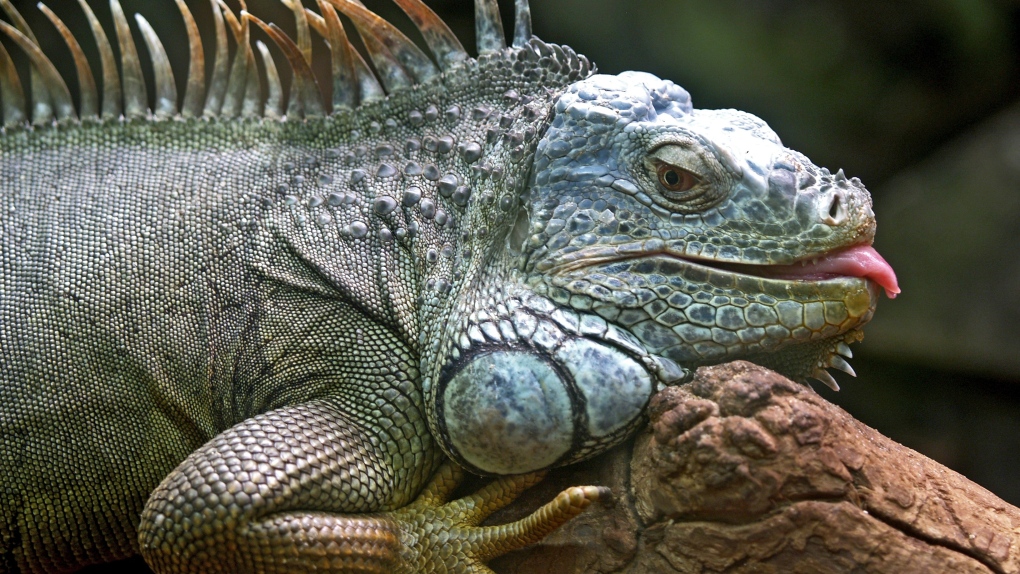
Two killed after collision with truck on Hwy. 417 near Limoges, Ont.
Ontario Provincial Police say two people were killed after a car and a transport truck collided in the westbound lanes of Highway 417 near Limoges, Ont. on Tuesday afternoon.
An iguana with a sweet tooth left a little girl without her cake and a rare infection, after biting the toddler before snatching a slice of cake.
On a family vacation to Costa Rica, a three-year-old girl was bitten on the back of her left hand by the lizard while she was enjoying a slice of cake on the beach. While the child originally had a small wound that quickly healed, five months later it grew to a rare bacterial infection known as Mycobacterium marinum (M. marinum).
According to a case report presented at the European Congress of Clinical Microbiology & Infectious Diseases conference, M. marinum is usually only reported in fish however it has infected humans through skin wounds coming into contact with contaminated fresh or saltwater.
While the bacteria is non-tuberculous, it can cause tuberculosis-like illness and is known for causing skin lesions on the fingers and hands, according to Iowa State University's Centre for Food Security and Public Health.
The child was brought to a California hospital to inspect the wound that grew into a large, mildly painful, red bump. An ultrasound determined the mass grew to a fluid-filled lump, so an orthopedic surgeon had to remove the 2-cm thick-walled mass from the wound before finding the infection.
The doctors who researched the findings say this is likely the first time a case of M. marinum infection is reported from an iguana bite, citing that most iguana bites are linked to other bacterial infections like a staph infection (staphylococcus aureus). Lead researcher Jordan Mah from Stanford University School of Medicine said the iguana's cold-blooded body is likely what stabilized the bacteria since M. marinum thrives in lower temperatures.
“The bite resulted in colonization by a bacterium rarely found in humans, and demonstrates that iguanas may be carriers of harmful bacteria capable of producing severe infections," Mah said in a news release. "This may help inform health care professionals of less commonly known bacterial infections following unusual zoonotic exposures."
This story has been updated to clarify M. marinum is a bacterial infection and not a viral infection.

Ontario Provincial Police say two people were killed after a car and a transport truck collided in the westbound lanes of Highway 417 near Limoges, Ont. on Tuesday afternoon.
Crucial witnesses took the stand in the second week of testimony in Donald Trump's hush money trial, including a California lawyer who negotiated deals at the center of the case and a longtime adviser to the former president.
As Wegovy becomes available to Canadians starting Monday, a medical expert is cautioning patients wanting to use the drug to lose weight that no medication is a ''magic bullet,' and the new medication is meant particularly for people who meet certain criteria related to obesity and weight.
A Chinese truck driver was praised in local media Saturday for parking his vehicle across a highway and preventing more cars from tumbling down a slope after a section of the road in the country's mountainous south collapsed and killed at least 48 people.
A 60-year-old man and a 55-year-old woman killed in a wrong-way crash on Highway 401 earlier this week have been identified by the Consulate General of India in Toronto.
A U.S. farmworker who caught bird flu after working with dairy cattle in Texas appears to be the first known case of mammal-to-human transmission of the virus, a new study shows.
A source close to singer Britney Spears tells CNN that the pop star is 'home and safe' after she had a 'major fight' with her boyfriend on Wednesday night at the Chateau Marmont in West Hollywood.
Electric scooters (e-scooters) have been gaining popularity in the capital and this season comes with some changes and updates.
Montreal's Felix Auger-Aliassime has advanced to his first ATP Masters final, and he hasn't had to play all that much tennis to do it.

Alberta Ballet's double-bill production of 'Der Wolf' and 'The Rite of Spring' marks not only its final show of the season, but the last production for twin sisters Alexandra and Jennifer Gibson.
A British Columbia mayor has been censured by city council – stripping him of his travel and lobbying budgets and removing him from city committees – for allegedly distributing a book that questions the history of Indigenous residential schools in Canada.
Three men in Quebec from the same family have fathered more than 600 children.
A group of SaskPower workers recently received special recognition at the legislature – for their efforts in repairing one of Saskatchewan's largest power plants after it was knocked offline for months following a serious flood last summer.
A police officer on Montreal's South Shore anonymously donated a kidney that wound up drastically changing the life of a schoolteacher living on dialysis.
Since 1932, Montreal's Henri Henri has been filled to the brim with every possible kind of hat, from newsboy caps to feathered fedoras.
Police in Oak Bay, B.C., had to close a stretch of road Sunday to help an elephant seal named Emerson get safely back into the water.
Out of more than 9,000 entries from over 2,000 breweries in 50 countries, a handful of B.C. brews landed on the podium at the World Beer Cup this week.
Raneem, 10, lives with a neurological condition and liver disease and needs Cholbam, a medication, for a longer and healthier life.
 An iguana with a sweet tooth left a little girl without her cake and a rare bacteria, after biting the toddler before snatching a slice of cake. (Pexels)
An iguana with a sweet tooth left a little girl without her cake and a rare bacteria, after biting the toddler before snatching a slice of cake. (Pexels)